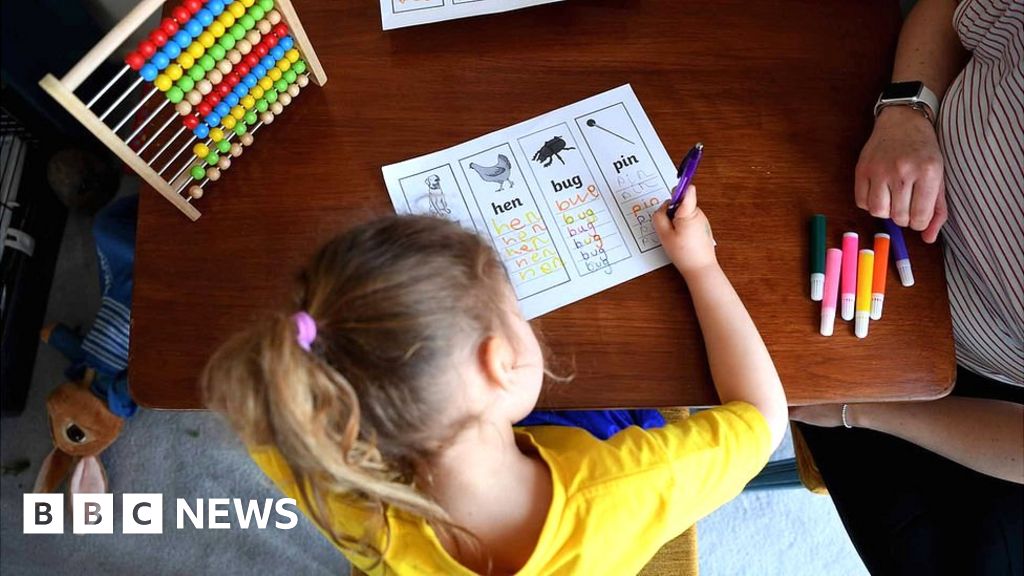- By Kevin Sharkey
- BBC News NI
Image source, DANIEL LEAL / Getty Images
The review was commissioned in response to commitments contained in the New Decade New Approach deal
An expansion to early years education is needed in Northern Ireland, an independent review has found.
It said two year olds should receive up to 20 hours of education per week and three year olds up to 22.5 hours.
“Increased investment will extend access and improve quality, enabling early diagnosis and intervention in cases of difficulty,” it continued.
The authors said early years investment is the most effective contribution to overcome socioeconomic disadvantage.
The Independent Review of Education was commissioned in response to commitments contained in the New Decade New Approach deal, which underpinned the restoration of the Northern Ireland Executive in January 2020.
It comes as schools across Northern Ireland face massive budgetary pressures.
However, the real-terms reduction, taking inflation into account, is likely to be higher.
Image source, Getty Images
Among the radical reforms being proposed is the eventual replacement of classroom assistants
The report, published on Wednesday, also identified failings in the provision of services for children with special educational needs (SEN).
Explaining that the system is not working as intended, the report concluded “thorough reform is urgently required”.
Among the radical reforms being proposed is the eventual replacement of classroom assistants with fully trained and qualified teachers, other professionals or upskilled classroom assistants.
However, the report acknowledged there should still be a role for classroom assistants who, the authors acknowledged, provide a vital and very helpful service.
‘Unviable schools’
The issue of “unviable” small schools with insufficient pupil numbers is also addressed.
The report found that a special commission should be set up to look at education, area-by-area, with a view to closing all unviable schools.
It said the proposals should come two years after the commission was established, followed by a 10-year implementation period.
The review has also come out against the ongoing development of a shared education campus in Omagh
Strule is the biggest school building project to be planned in Northern Ireland.
Arvalee Special School, which opened in 2016, is one of of six schools proposed for the site.
The panel said the project should cease because it believes it does not provide any educational advantage and the proposed cost cannot be justified.
Arvalee principal Jonathan Gray said he was shocked to hear the recommendation.
“We have the land, we have that space for the schools,” he said. “The money has to be spent anyway, we need it out in the west, the facilities need to be enhanced for the children,” he said.
Jonathan Gray said he is “at a loss” by a recommendation for the Strule project to cease
“I’m at a loss until I read the detail. I just don’t understand it at the moment,” Mr Gray continued.
Other recommendations in the report included increasing the school leaving or compulsory education age from 16 to 18.
It also wants vocational pathways for school pupils to begin at 14 years of age, alongside reforms of further and higher education to enhance collaboration with schools and universities as well as closer involvement with business and industry.
‘Uplift in education budget needed’
On funding, the report found there is an immediate need to uplift the education budgets by £291m annually.
Education in Northern Ireland is “seriously underfunded”, review panel chair Dr Keir Bloom told BBC’s Talkback programme, but the quality of educational provision would provide a “fairly solid base” for reform.
Dr Keir Bloom was the chair of the review panel
The director of the Association of School and College Leaders NI, John Trueman, said the report “pulls no punches” and has urged Stormont to “implement the funding recommendations set out in the report as a matter of urgency”.
Education Authority chief executive Sara Long also welcomed the call for an immediate uplift in funding “following a decade of chronic underfunding”.
The Controlled Schools’ Support Council (CSSC) chief executive Mark Baker thanked the review panel for listening to its concerns and said education in Northern Ireland needs “evidence-based transformation”.
Single department
A single education department at Stormont is another of the report’s proposals. The Department of Education is currently responsible for primary and post-primary schools while the Department for the Economy oversees further and higher education institutions.
Dr Bloom said there is poor collaboration between schools and colleges due to separate funding arrangements.
A single governing body for further education colleges has also been proposed.
Mergers and academic selection
The report also recommends major reform of the curriculum and its management, and a reconfiguration of the network of schools with the potential to create new “jointly-managed community schools” by merging schools from different sectors.
This would result in around 20% of pupils being enrolled in a “jointly-managed” school by 2031.
There is a recommendation that “all learners at all stages should have the opportunity to learn alongside individuals from other communities and backgrounds in the same classroom”.
Reform of the transfer of pupils from primary to post-primary schools to “reduce differences between academically selective and non-selective schools” was also proposed, with schools to take a “pupil profile approach” to selection – this could be through multiple, smaller assessments rather than a single transfer test.
Youth assembly members Andrew Martin, Robert Moore, Oliver Mercer, Charlotte McGucken attended a launch event for the report
“It’s going to need action and it’s going to need an executive and assembly to implement. That’s going to be up to our politicians, to have the courage to implement,” junior assembly member Andrew Martin said after the report was announced.
Robert Moore said the youth assembly will be “very proactive” in urging politicians to implement these recommendations, once the executive is restored.
Learners have been “listened to” with the proposals put forward in the report, Oliver Mercer said.
“The younger that you’re bringing people together… that [continues] as you get older,” Charlotte McGucken said on proposals for school mergers.

William Turner is a seasoned U.K. correspondent with a deep understanding of domestic affairs. With a passion for British politics and culture, he provides insightful analysis and comprehensive coverage of events within the United Kingdom.








